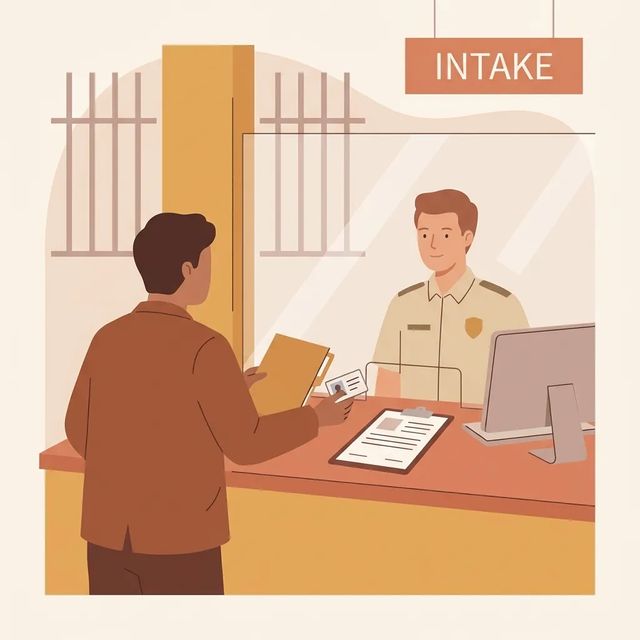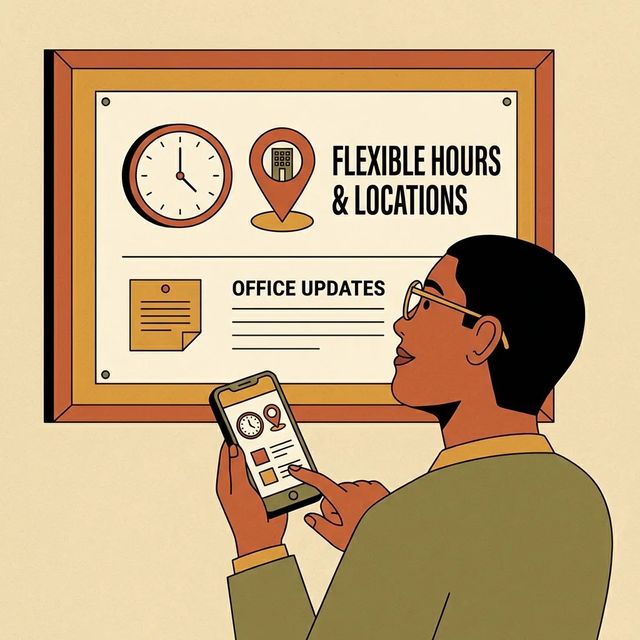Lyon Detention Center, KS
Explore
Find an Inmate at Lyon Detention Center, KS
Search for a loved one and send messages and photos in minutes.

Guides for This Facility

How to Reach Lyon County (including Lyon Detention Center): phone, address, and office hours
Need to reach Lyon County about someone in custody? A phone call during weekday business hours is usually your fastest option. Here's what you need.
Read Guide
How to Turn Yourself In on a Warrant at Lyon County (Detention Center & Walk-In Docket)
If you have an active warrant in Emporia, you've got two official options: turn yourself in at the Lyon County Detention Center, or show up at the Emporia Municipal Court Walk-In docket on Tuesday morning.
Read Guide
Who to Call About an Inmate at Lyon Detention Center — Lyon County contact info
Need a starting point? Lyon County's main phone number is 620-341-4380. The offices are at 430 Commercial Street, Emporia, KS 66801, open Monday through Friday, 8:00 am to 5:00 pm. They're closed weekends and federal holidays. Keep in mind these are county office hours, not the jail's front-desk schedule—but they're a good baseline for when someone can route your call.
Read GuideAt a Glance
Sending Money
- Lyon County event bookings accept cashier's checks, money orders, and business checks payable to the Lyon County Treasurer.
- A listed Lyon County full-event facility requires a $600 deposit to reserve the venue.
- Another Lyon County facility requires a $550 deposit and lists fees due at least two weeks before the event.
Inmate Lookup
- To confirm custody or discuss release options at Lyon County Detention Center, call (620) 341-3205.
- Use KASPER to search for KDOC residents and to view basic custody and location information.
- County inmate rosters or sheriff searches often show bookings, charges, and profile details for county custody cases.
Contact Info
- Lyon County central office is at 430 Commercial Street, Emporia; phone 620-341-4380; office hours Monday–Friday 8:00 am to 5:00 pm.
- To check for a bench warrant in Emporia Municipal Court, call the Court Clerk’s Office at 620-343-5666.
- City of Emporia Utility Billing contact: 111 East 6th Avenue, P.O. Box 928; phone 620-343-4250; hours Monday–Friday 8:00 am to 5:00 pm.
Facility Info
- You may turn yourself in at Lyon County Detention Center or appear at the Walk‑In docket (Tuesday mornings) to address an active warrant.
- Defendants who want to be seen by the judge during the Walk‑In docket must be signed in with the Clerk’s Office by 9:45 am that morning.
- To request copies of evidence for an active court case, submit a Discovery Request Form; reproduction fees may apply.
Based on official sources and community feedback. Learn how we verify
Topic Overviews
Sending Money
Lyon County accepts cashier's checks, money orders, and business checks payable to the Lyon County Treasurer for facility bookings. Deposit requirements vary by venue—one full-event facility requires a $600 refundable deposit, while another lists $550 with fees due at least two weeks before the event. For property-tax payments and some other county transactions, you can pay online through the Kansas.gov portal using major credit cards or e-check. At Lyon Detention Center, inmates typically have an account set up at booking that family and friends can fund for commissary, phone time, and medical charges. Common deposit methods include lobby kiosks, approved online or phone vendors, and mailed cashier's checks or money orders. Confirm the accepted channel before sending funds.
Inmate Lookup
The fastest way to verify whether someone is in custody at Lyon County Detention Center—or to ask about release options—is to call (620) 341-3205. If the person might be in Kansas Department of Corrections custody, search KDOC's public KASPER system for basic custody and location details. For county-level bookings and charge information, check Lyon County's online inmate roster or the sheriff's inmate search. Keep in mind that county rosters vary in how quickly they update. To track custody changes statewide, sign up for Kansas VINE for automated alerts on releases, transfers, and bond. You can also check case and court records through the Kansas district court portal.
Contact
Lyon County's central office is at 430 Commercial Street in Emporia—call 620-341-4380 for Lyon Detention Center matters. Hours are Monday–Friday, 8:00 am to 5:00 pm (closed weekends and federal holidays). To ask about bench warrants through Emporia Municipal Court, call the Court Clerk's Office at 620-343-5666. For City of Emporia utility billing questions, contact 620-343-4250 or visit 111 East 6th Avenue (P.O. Box 928) during regular business hours. Utility Billing is also available through the City of Emporia's online payments site.
Read full guideFacility Info
Lyon County runs intake and detention around the clock. Initial processing follows standard booking steps: fingerprinting, photographing, and a medical screening. If you have an active warrant, you can turn yourself in at Lyon County Detention Center or appear at the Walk‑In docket held Tuesday mornings. To see the judge at that docket, sign in with the Clerk's Office by 9:45 a.m. Need to change a court date? Submit a Motion to Advance Hearing or Motion to Continue Hearing, though changes aren't guaranteed—the Court Clerk can provide status and instructions. For an active case, request copies of evidence by submitting a Discovery Request Form (reproduction fees may apply). Municipal convictions can be appealed to the Fifth Judicial District within 14 days.
Read full guideCommon Questions
Showing 6 of 12How can I add money to an inmate's account at Lyon Detention Center?
Kansas jails typically open an inmate account at booking. Family and friends can add funds for commissary, phone time, and other charges through lobby kiosks, approved online or phone vendors, or mailed cashier's checks and money orders. Never hand cash directly to staff. Confirm Lyon Detention Center's accepted deposit channels and any required inmate ID before sending money.
Sending MoneyWhat payment methods does Lyon County accept for booking county facilities?
For Lyon County facility bookings, payments commonly include cashier’s checks, money orders, and business checks payable to the Lyon County Treasurer.
Sending MoneyHow much is the deposit to reserve a Lyon County facility?
Deposits vary by venue. One listed full-event facility requires a $600 deposit, while another Lyon County facility lists a $550 deposit and notes fees are due at least two weeks before the event.
Sending MoneyHow can I find out whether someone is in Lyon County Detention Center?
Call Lyon County Detention Center at (620) 341-3205 to confirm whether the person is in custody and to ask about release options.
Inmate LookupWhat online tools should I use to search for an inmate in Kansas?
Use KDOC’s KASPER for state custody searches, and the county’s online inmate roster or sheriff search for county jail bookings and charges. For updates and broader tracking, Kansas VINE provides alerts, and the Kansas district court portal can help you check case status.
Inmate LookupCan I get automatic custody-change alerts for someone in Kansas?
Yes. Sign up for Kansas VINE to get automated alerts about custody changes statewide, including release, transfer, and bond notifications.
Inmate LookupMore Guides
Ready to Connect?
Search for your loved one to start communicating today
Did You Know?
Have an active warrant? You can handle it by turning yourself in at Lyon County Detention Center or by showing up at the Walk-In docket on Tuesday mornings. Here's what to know about both options.
This guide is compiled from official facility documentation and community feedback. Learn how we verify
